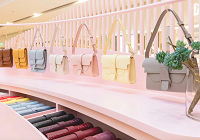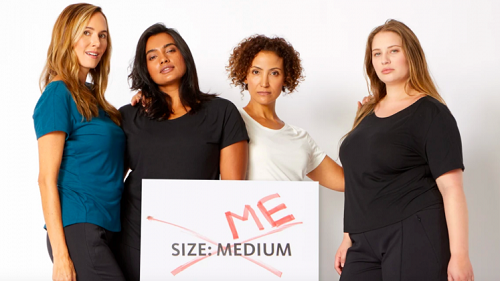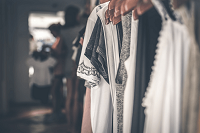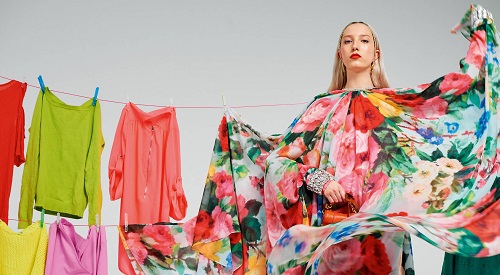FW
The British Fashion Council (BFC) has called for more government support as data by Oxford Economics predicts the UK Fashion industry will lose 240,000 direct jobs. The data also predicts a further 110,000 indirect jobs to be at risk causing the industry’s total revenues to drop to £88 billion this year, compared to £118 billion in 2019. The New West End company also predicts a £5 billion loss in sales and 50,000 job losses if the government doesn’t take further action.
Hence, the council has laid out seven proposed measures tailored to the needs of fashion businesses. These measures include: government support for brands and retailers to renegotiate expensive leases and help keep retail stores open until footfall starts to recover; access to grants or interest-free loans for small and medium-sized businesses; an embargo placed on payments of tariffs to help restart international trade, and legislation to prevent large retailers from canceling orders or imposing sell-through guarantees on orders, which will help protect smaller businesses with limited cash flow.
The BFC is also demanding funds to enable research into sustainable practices like upcycling or waste management that will help restart the industry in a healthier, more circular way. It also highlights the importance of supporting the local manufacturing and textile industries, with the government building on its commitment to produce 2 billion pieces of personal protective equipment in the UK and further investing in the development of skills, material innovations beyond PPE, and tax-relief schemes that will create the “right trading environment.
Even though Asos is cautious about future growth outlook, the e-tailer is on track to deliver strong year-on-year profit growth and to return to positive free-cash-flow for the full year. First quarter online sales of Asos rose 10 per cent to £983.3 million. Though this was less than the 17 per cent rise in the 10 months to the same date but covering a period of unprecedented economic disruption, it was a strong result.
The UK sales of the fashion e-tail giant dipped by 1 per cent to £329.1 million while those in the US declined 2 per cent to £124,9 million. But, the company’s sales in the EU rose by 20 per cent to £328 million and in the rest of world unit rose by 19 per cent to £201.2 million. Its overall international retail sales rose by 15 per cent.
Though hampered by social distancing protocols, the e-commerce company saw steady improvement throughout the period, reflecting increasing warehouse capacity, underlying improvement in demand and a beneficial returns profile. While the company’s product volume grew by 15 per cent, its average selling price declined due to lockdown product mix and limited demand for occasion wear. It had adapted fast to refocus its product mix, but growth in popular lockdown categories was held back by availability given health and safety measures implemented across our product supply chain”.
However, the Asos’ consumer base increased 16 per cent to 23 million with particularly strong growth in new international customers.
PVH Corp, the parent company of Calvin Klein, Tommy Hilfiger and several other fashion brands, plans to close all 162 of its heritage brand stores across North America in response to the Coronavirus pandemic.
Heritage Brand includes IZOD and Van Heusen, of which there are currently eight joint storefronts in New Jersey. All locations are expected to close by late 2021. Although not touted as a liquidation sale, IZOD and Van Heusen are currently offering up to 70 per cent off site-wide online. The company also operates Olga, Geoffrey Beene, ARROW, Warner’s and True & Co brands that do not have stores, but can be found at places like Amazon, Kohl’s, Macy’s and JC Penney.
PVH Corp also plans to lay off 12 per cent of its workforce, which would result in cost savings of about $80 million. It has been a rough few months for the brick-and-mortar retail industry, which already had been struggling before the pandemic hit. Many retail companies including Brooks Brothers and Sur La Table have announced stores closures.
 Though earlier fashion brands maintained stoic silence about the existence of labor camps in Xinjiang for fear of businesses being penalized, a new campaign to pressure brands to end ties with factories connected to forced labor is gaining momentum. The issue of forced labor is not confined to Xinjiang region alone. Manufacturers across China are using thousands of Uighur workers under state-sponsored labor transfer programs, in conditions that appear in many cases to be forced labor, says Kelsey Munro, Senior Analyst, Australia Strategic Policy Institute (ASPI).
Though earlier fashion brands maintained stoic silence about the existence of labor camps in Xinjiang for fear of businesses being penalized, a new campaign to pressure brands to end ties with factories connected to forced labor is gaining momentum. The issue of forced labor is not confined to Xinjiang region alone. Manufacturers across China are using thousands of Uighur workers under state-sponsored labor transfer programs, in conditions that appear in many cases to be forced labor, says Kelsey Munro, Senior Analyst, Australia Strategic Policy Institute (ASPI).
With a view to end abuses, EU Parliament member Raphaël Glucksmann, started a campaign on June 27 to pressure brands to end ties with factories connected to forced labor. Based on a March 2020 report by ASPI, the campaign implicated 83 companies as being directly or indirectly involved in forced labor.
factories connected to forced labor. Based on a March 2020 report by ASPI, the campaign implicated 83 companies as being directly or indirectly involved in forced labor.
Brands pledge to end forced labor
To verify these claims, Glucksmann met Adidas and received a signed letter from the brand agreeing to the terms of campaign and a reassurance that henceforth the brand will not source any yarn from the Xinjiang region. Lacoste, which gets supplies from Youngor Textile Holdings, also pledged to cease all activities with suppliers and subcontractors involved in the exploitation of Uighur forced workers, make all of its efforts public and conduct due diligence among its entire production chain in China.
The third brand that pledged to cut ties with factories involved in exploitation of Uighurs workers is Nike. The brand released a statement in March stating that its Taekwang factory stopped recruiting new employees from XUAR [Xinjiang Uighur Autonomous Region] to its Qingdao facility in 2019 and all remaining employees from XUAR have returned home.
Backing on suppliers’ support
However, some brands’ are relying on their suppliers’ support to ensure they not get involved in forced labor in any way. Victoria’s Secret parent company L Brands has directed all suppliers to re-certify that they have read and understood it’s no forced labor policy, including the prohibition on the use of cotton from Xinjiang Uighur Autonomous Region, and any other form of forced labor.
H&M Group has conducted an investigation at all garment manufacturing factories that it works with in China and concluded that none of them employ workers from Xinjiang. The audit program conducted by Puma also did not find forced labor or connections to Xinjiang in its Tier 1 and Tier 2 suppliers. Jack & Jones’ Bestseller has banned production in Xinjiang and is conducting due diligence. Gap too has denied sourcing from Xinjiang and is taking steps to better understand how its global supply chain may be indirectly impacted by this.
 Eco-friendly fashion is the new buzzword as high street fashion brands like Zara, H&M are launching sustainable collections with aspirational names like C&A's ‘Wear the Change’, Zara's ‘join life’ or H&M's ‘Conscious’. Capitalizing on the consumers’ growing interest in ecologically produced items, these brands are creating their own sustainability labels and criteria. However, they rarely divulge about their production processes, says Katrin Wenz, an agricultural expert.
Eco-friendly fashion is the new buzzword as high street fashion brands like Zara, H&M are launching sustainable collections with aspirational names like C&A's ‘Wear the Change’, Zara's ‘join life’ or H&M's ‘Conscious’. Capitalizing on the consumers’ growing interest in ecologically produced items, these brands are creating their own sustainability labels and criteria. However, they rarely divulge about their production processes, says Katrin Wenz, an agricultural expert.
According to Viola Wohlgemuth, Textiles Expert, Greenpeace, independent environmental certifications like the Global Organic Textile Standard label (GOTS) and the IVN Best certifications, can illuminate on the eco-credentials of the products launched by such brands.
Adhering to ecological and social production standards
Though most of these brands use organic cotton, this alone is not enough to make fashion sustainable, says Heike Hess, Head, IVN-Berlin. According to him, cotton production is a complex process as after being grown in fields, the fibers need to be separated from seeds, spun, dyed, printed and sewn to create finished items of clothing. Also, cotton producers need to adhere to ecological and social standards at each of these production stages. They have to not only minimize the use of harmful chemicals but also manage water usage and waste, limit carbon dioxide emissions and ensure human rights, fair wages, protections for workers, etc.
According to him, cotton production is a complex process as after being grown in fields, the fibers need to be separated from seeds, spun, dyed, printed and sewn to create finished items of clothing. Also, cotton producers need to adhere to ecological and social standards at each of these production stages. They have to not only minimize the use of harmful chemicals but also manage water usage and waste, limit carbon dioxide emissions and ensure human rights, fair wages, protections for workers, etc.
Since launching ‘Detox My Fashion’ campaign by Greenpeace in 2011, around 80 global fashion companies have committed to eliminate hazardous chemicals by the end of this year. To achieve this, the cotton cultivation method needs to change. According to Sabine, Ferenchild, Sudiwind Institute for Economics and Ecumenism, in order to be truly sustainable, cotton needs to be grown in regions with heavy rainfall and in combination with food crops.
New label prevents responsibility offloading by fashion companies
Ferenschild is highly skeptical of fashion brands who devise their own criteria for going green and labeling their products. Majority of products these brands sell are produced conventionally.
As a solution to this, Germany has launched a new green certification method with its government-backed ‘Green Button’ label. A company can use this label only if all its products comply with high environmental and labor standards. Though these standards are not as strict as those demanded by organic certifiers, the 'Green Button' label can prevent companies from offloading responsibility to subcontractors in the production chain, say experts.
Lack of clarity over sustainability percentage
Even though organic cotton is 50 per cent more expensive than conventional cotton due to the use of premium fibers boosts, global fashion brands like H&M are able to keep their prices down, as they produce in huge volumes, says Ferenschild.
However, it is not clear what percentage of organic cotton is used in the items produced by these brands. Though H&M claims to use 16 per cent organic cotton in all its clothes produced from 2017-18, according to the Bremen Cotton Exchange, just 0.7 per cent of the global cotton harvest during the season was organic.
Moving from production to service model
Experts say, the real culprit in all this is the consumptions habits of consumers. Even if fashion brands want to produce truly sustainable fashion, current consumption patterns make it impossible. To change this, the fashion industry needs to shift away from the production to service model, says Wohlgemuth. While achieving this, they need to encourage their consumers to buy fewer and long-lasting clothes, repair damaged clothes, donate clothes no longer in use and buy secondhand clothes instead of new ones.
As per Apparel Resources analysis, the value of T-shirts imported by the US declined by 65.50 per cent in May ’20, due to unprecedented situation created by COVID-19. The country imported $613.96 million worth of T-shirts in May, while its import value in the same month of 2019 stood at $1.78 billion.
On monthly basis, the imports of T-shirts by the US declined by 29.26 per cent in May ’20 over April ’20. China exported the most number of T-shirts to the US in May worth $94.95 million. While Bangladesh exported only $23.16 million worth of T-shirts with export value declining by over 63 per cent on Y-o-Y basis from US $ 63.47 million in May ’19.
India’s T-shirt shipments to the US fell 85.80 per cent to generate $14.40 million revenue. Exports continued to plunge in February, March and April as well. Vietnam too experienced a yearly fall of 47.86 per cent in May ’20 with its shipment valued at $154.80 million. However, the country remains top T-shirt exporter to the US with over 25 per cent share in its total T-shirt import values.
The Transformers Foundation hosted it’s first-ever summit as a non-profit organization after splitting from the Kingpins denim trade shows. Titled ‘Catalysts’, the digital event focused on actively addressing and facilitating change in key areas of the denim supply chain to increase sustainability. It reprised the theme of the summit of the same name staged as part of Kingpins in Amsterdam in October 2019.
Catalyst also introduced the audience of denim industry professionals to makers of new ways of 'growing' fibers, clever traceability systems, new pigments, visionary brands, and more. The event was live-streamed via Zoom and featured a series of panels and presentations. Speakers included: Jenny Fredricsdotter, Re:newcell; Luciano Bueno, Galy; Shannon Mercer, Fibertrace; John Condilis, Nobody Denim; Sedef Uncu Aki, Orta; Jane Palmer, Nature Coatings; Darren Glenister, Material Exchange; Jorgen Sevild, Inqova; Jordan Nodarse, Boyish; Anna Foster, ELV Denim; and Tony Tonnaer, Kings of Indigo.
As most European luxury destinations having reopened, luxury brands in the Netherlands are relying on domestic and international travelers to drive demand. Major cities such as Amsterdam are being re-connected through direct flights too. Opening of mono-brand stores by Chanel and Hermes in Amsterdam coupled with a spurt in luxury hotels in the city and its growing luxury retail have made the Netherlands one of the most attractive destinations for Chinese and Middle East travelers.
Some of these high net worth travelers to The Netherlands are from the banking, agriculture and industry sectors. They prefer to shop locally for major international luxury branded products. Italy and Spain are just some of the preferred tourism destinations for the wealthy Dutch. Even though they may wear expensive branded apparels or accessories, they are driven by an effortless approach rather than a show-off factor. Hence, the country offers them a mix of luxury brands such as Louis Vuitton or Hermes.

The Textile Machinery Association of Sweden (TMAS) is deeply committed to sustainability, which it not only sees as its biggest challenge but also the largest opportunity. A forum of Swedish textile machinery manufacturers, TMAS has a wide range of member manufacturers who contribute towards the A to Z of textile manufacturing.
Mapping corporate carbon footprint
TMAC has partnered ClimatePartner to study and reduce corporate carbon footprint with the desired goal being net zero. More than 50 per cent of TMAS members have started working on the project, calculating each individual member’s three scopes towards reducing emissions.
Therese Premler-Andersson, Secretary General, TMAS explains, “Integrating climate action into strategies is becoming increasingly important in Europe and we have decided to take a pro-active role. There is growing pressure from customers to be more transparent in this area and forthcoming legislation will soon make it necessary for all to take climate actions. TMAS members, however, recognize the benefit of taking action now, not least in terms of taking responsibility and demonstrating credibility.”
Andersson goes on to add that, “Each company is very different in terms of size, structure and operations, but they share common goals in the design and production of textile machinery that is flexible and highly automated, and wherever possible enables savings in energy, water and chemicals consumption.” The textile industry has become highly globalised over many decades and will benefit greatly from the close examination of practices and supply chains. The pandemic led to many new ideas about how to do things differently, out of necessity. It saw the introduction of new and innovative digital tools and remote services that are here to stay, and will have important roles to play going forward.
TMAS members are all about a holistic way of doing business. They understand and are prepared to integrate every department into the sustainable system to make it work to the optimum. This in turn becomes a transparent, intelligent and efficient system for their conscious customers who are buying machinery that help them manage their sustainability goals as well, through efficient management of wastage, quality output and enhanced productivity.
Leading by example
The world is observing the growth of interest in local manufacturing of textiles in Sweden, maintaining the highest protocols of sustainability and developing robust sustainable production chains. Sweden is now moving all parts of production within, decreasing carbon footprint and imports, leading to a more controlled and higher quality output. “TMAS members help automate and streamline textile production, reduce waste and emissions and contribute to increased quality and flexibility,” says Therese Premler-Andersson. These requirements are crucial to respond to a market undergoing the transition towards circularity and sustainable business models. The initiative for the fair comes at the right time when local production is something more people are considering and it will be exciting to present Swedish solutions in Sweden.
TMAS’ collaboration with Climate Partner has been of great success as the latter offers carbon neutrality labels that are 100 per cent authentic, transparent and widely-accepted as industry benchmark.
PVH has joined a growing list of US-based fashion groups taking drastic actions as they face the ongoing financial challenges posed by the Coronavirus crisis. The NYC-based owner of Tommy Hilfiger and Calvin Klein is closing its heritage brands retail business as part of wider efforts to streamline its operations in North America in the wake of the COVID-19 pandemic.
The fashion group’s heritage brands include Van Heusen, Geoffrey Beene, Izod, Arrow, Warner’s, True & Co and Olga. The division’s retail business is made up of 162 outlet stores, with Van Heusen constituting the primary owned brick-and-mortar retail channel. Streamlining plans in North America also involve the reduction of office workforce in the region by 450 positions. These reductions will be spread across PVH’s three brand businesses and corporate functions, and are expected to result in annual cost savings of around $80 million.
As it carries out these strategic initiatives, PVH expects to incur pre-tax charges of approximately $80 million over the next 12 months, $10 million of which should be noncash. These charges will largely be related to severance, lease terminations and inventory markdowns, as well as noncash asset impairments.












